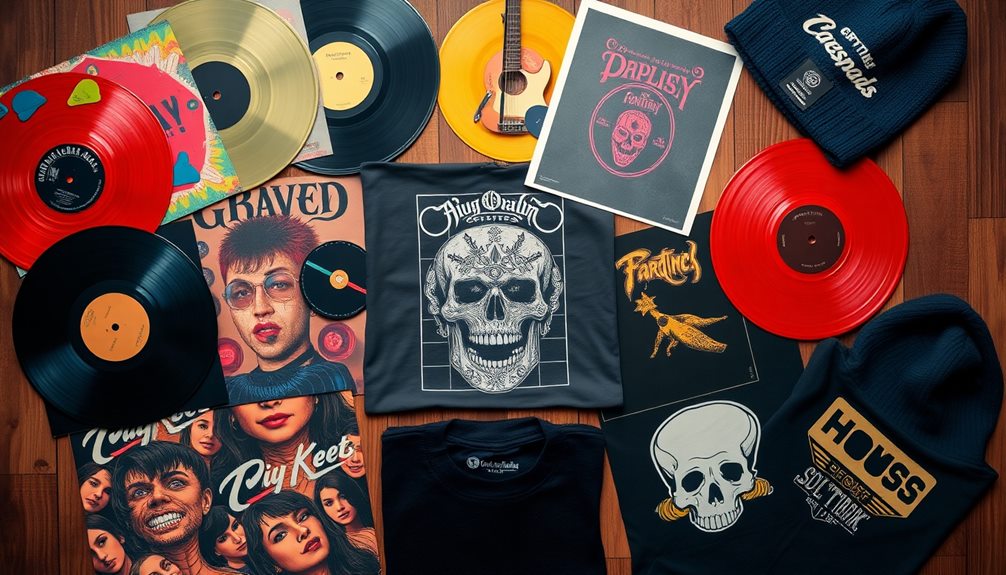So, you're ready to rock the music scene and land that dream record deal, huh? Well, buckle up, because we've got the ultimate guide to help you strut down that path to stardom! First off, learn the record label ropes – major or indie, the choice is pivotal. Next, nail down those demos like a pro to grab attention. And don't forget the nitty-gritty of contract essentials and industry connections hustle. But hey, if you want to know even more about conquering the music label domain, stick around to uncover all the secrets to elevate your music game!
Key Takeaways
- Research potential labels that align with your music style and career goals.
- Network and build connections within the music industry.
- Craft high-quality demos showcasing your talent effectively.
- Understand different types of record deals and contracts.
- Seek mentorship and guidance from established artists for insider tips.
Understanding Record Label Types
When exploring the music industry, understanding the various types of record labels becomes essential for aspiring artists. Major labels like Sony, EMI, Warner, and Universal are the big shots, ruling the commercial music domain with their massive resources and wide reach. On the flip side, independent record labels offer a more intimate vibe, giving artists different levels of control and marketing power. Think of major labels as the cool kids at a school dance, while indie labels are like the quirky group hanging out in the library – each has its charm!
Now, let's talk record deals. From 360 deals where the label gets a cut from almost everything you do to standard royalty deals giving you a percentage of sales, there are various agreements to navigate. Major label subsidiaries, operating under the big labels, can be your ticket to more support and resources for artist development. So, choose wisely, young grasshopper, as finding the right label fit can make or break your music industry journey.
Researching Potential Labels

Alright, folks, it's time to get down to business and delve into those potential labels!
We're talking about analyzing label criteria, evaluating artist rosters, and gathering contact information.
Let's roll up our sleeves and immerse ourselves in the exciting world of researching labels to find the perfect fit for our music journey!
Label Criteria Analysis
In our pursuit to secure a music label deal, researching potential labels for alignment with our music style and career goals is essential. When analyzing record labels, it's vital to examine if they have a track record of nurturing artists and a good fit with our sound. Here's a helpful table to aid in guiding your research:
| Criteria | Description |
|---|---|
| Artist Roster | Check if the label represents artists similar to your style for a synergy. |
| Market Reach | Evaluate the label's reach to make sure your music can reach a wider audience. |
| Success Record | Look into the label's past successes to see if they can assist you in getting signed. |
Artist Roster Evaluation
After examining the label criteria, our focus shifts to evaluating the artist roster of potential labels to align with our music style and career objectives. Here's how we delve into the artist roster evaluation:
- Genre and Style Match: We research to confirm the label's roster aligns with our music style and genre preferences.
- Size and Diversity: We look at the label's artist roster size and diversity to understand their reach and appeal in the market.
- Emerging vs. Established Artists: By examining the mix of emerging and established artists on the label, we gain insights into their promotion strategies.
- Fanbase and Success Levels: We evaluate the fanbase engagement and success levels of artists on the label to gauge their impact and potential growth in the industry.
Contact Information Gathering
As we begin researching potential labels for our music career, our primary focus is on gathering contact information to establish connections within the industry. It's like being a musical detective, hunting down A&R representatives, label executives, and those elusive submission emails.
We delve into official websites and industry directories, scouring for those golden nuggets of contact details. Don't forget to check out the label's submission guidelines; it's like deciphering a secret code to access the door to your dreams.
And hey, social media platforms like LinkedIn can be your backstage pass to rubbing elbows with label reps. If you're feeling adventurous, why not attend industry events? Who knows, you might just stumble upon the contact info that changes your music career trajectory forever!
Navigating Record Deal Types

Exploring the diverse landscape of record deal types reveals a range of opportunities and considerations for aspiring musicians.
- 360 Deals: These extensive agreements involve the label taking a percentage of all artist revenue streams, from music sales to merchandise. While they offer significant financial backing, they can limit an artist's independence.
- Standard Royalty Deals: In these traditional contracts, artists receive a percentage of sales, usually around 15% to 20%. They provide more artistic control but may lack the marketing power of other deal types.
- Licensing Deals: Artists retain more ownership of their music in these agreements, allowing them to license their songs for various uses while still earning royalties.
- Profit Share Agreements: These deals involve sharing profits from music sales, tours, and other ventures. They offer a collaborative approach between artists and labels, ensuring both parties benefit from successes.
Understanding these nuances in record deal types, including the duration of contracts, rights involved, and royalty split standards, is essential for making informed decisions in the music industry.
Crafting Quality Demos

Exploring the diverse landscape of record deal types offers valuable insights for aspiring musicians. An essential aspect in this journey is crafting quality demos that showcase your talent effectively. When it comes to crafting quality demos, think of it like baking a delicious cake – you need the right ingredients and a sprinkle of magic! Seek feedback from your nearest and dearest, and don't forget to align your sound with the label's audience. After all, you wouldn't want to bring a pop song to a heavy metal party!
Oh, and here's a pro tip: avoid sharing those half-baked, incomplete drafts. Labels want to see your A-game, not your practice sessions. Also, make sure your vocals are cleared – you don't want any legal hiccups ruining your chance at stardom. So, polish up those demos, get feedback from the pros, and soon enough, you'll be on your way to signing that dream deal!
Artist Contract Essentials

Alright, let's talk about the nitty-gritty of artist contracts – the bread and butter of the music industry.
These contracts are like the rulebook for your musical journey, outlining everything from who gets what to when and how.
Key Contract Terms
Understanding the key contract terms is crucial for both artists and record labels to establish a clear and mutually beneficial working relationship. When delving into artist contracts, here are some key points to bear in mind:
- Rights and Responsibilities: Clearly outline who's the rights to what music and the responsibilities each party holds.
- Legal Documents: These aren't just boring pieces of paper! Legal documents in artist contracts are essential for protecting everyone involved.
- Tailored Contract Terms: Contracts are like custom-made suits – they need to fit just right for both the record label and the artist.
- Clarity is Key: Don't let complicated jargon confuse you! Make sure the terms are crystal clear before putting pen to paper.
Negotiation Tips
Negotiating artist contracts requires a thorough understanding of the rights and responsibilities for both the label and the artist. From exclusive recording deals to licensing agreements, these contract essentials shape the music industry landscape.
Imagine this: clear communication acts as the melody, while legal understanding sets the rhythm for successful negotiations. It's like creating a chart-topping hit – every note must be on point.
Before diving headfirst into the contract, make sure all terms are crystal clear. Think of it as reading the fine print on a concert ticket – boring yet necessary.
Utilizing Social Media Presence

Leveraging social media presence is essential in gaining visibility and connecting with key figures in the music industry. Here are some innovative ways you can maximize your online presence to catch the eye of music labels:
- Engage Authentically: Interact with artists and labels on various social media channels to demonstrate your genuine interest in their work. Authentic engagement can help you build meaningful connections within the industry.
- Networking Power: Use social media as a powerful networking tool to connect with industry professionals and potential collaborators. Building a strong network online can open doors to exciting opportunities.
- Showcase Your Skills: Highlight your music promotion skills and online engagement tactics through your social media profiles. Showcasing your abilities can attract the attention of labels looking for artists who are proactive in promoting their work.
- Stay Updated: Keep track of artists' activities and releases on social media to stay connected within the industry. Being informed about what's happening in the music world can help you engage in relevant conversations and build relationships with key players.
Balancing Labels and Self-Releases

Having experienced the challenges firsthand, independent artists like us grasp the dilemma of finding the right equilibrium between working with music labels and self-releasing. Balancing creative control with industry connections while striving to define our unique sound can feel like juggling a mic and a guitar simultaneously – a tricky yet manageable feat!
Let's dissect this dilemma in the following table:
| Balancing Releases | Pros | Cons |
|---|---|---|
| Label Releases | Industry connections, marketing power, wider reach | Less creative control, lower revenue share |
| Self-Releases | Creative freedom, higher revenue share | Limited reach, marketing challenges |
Starting Your Own Label

So, you're considering starting your own music label, huh?
Well, get ready to express your creativity and call the shots on your music releases.
Owning a label means you can sign and promote artists that align with your vision and vibe – the music industry is your oyster!
Label Ownership Pros
Starting your own music label provides independent artists with unparalleled creative freedom and control over their artistic vision and brand identity. Here are some sweet perks:
- Creative Control: You get to call the shots on everything from the music style to the album art. It's your world; they're just living in it.
- Sign Artists: You can be the one discovering the next big thing in music and helping them shine in the spotlight.
- Revenue Percentage: Keep more of that hard-earned cash from music sales and streams. Cha-ching!
- Artist Development: Nurturing talent and watching it grow under your guidance is like planting seeds and seeing them bloom into musical flowers.
Owning your label is like being the maestro of your own symphony – conducting every note of your musical destiny.
Independent Artist Benefits
Envision this: immersing yourself in the world of establishing your own music label as an independent artist opens doors to unmatched creative autonomy and ownership. When you delve into the realm of independent labels, you're not just signing a deal; you're becoming the master of your music business destiny.
Imagine this scenario: you, as an independent artist, holding the reins of your record label would mean total control over your sound, image, and brand. The beauty of it all? You get to keep those precious master recordings and publishing rights close to your heart.
Plus, envision the thrill of discovering and supporting other emerging talents under your wing. Starting your own label isn't just a business move—it's a chance to shape the future of music, one beat at a time.
Targeting Suitable Labels

When targeting suitable labels for your music, research their specialization in your genre and style to guarantee a good fit. It's like finding the perfect pair of shoes; you want them to complement your style and make you feel like a rockstar. Here are some tips to help you hit the right note:
- Check Their Roster: Look at the artists they work with. If they're producing killer tracks in the electronic music scene and that's your jam, you might've found your match!
- Artist Preferences: Consider labels connected to your favorite musicians. They might share your artistic vision and help you flourish like a musical protege.
- Artist Development: Seek labels known for nurturing talent. You want someone who'll polish your rough edges and help you shine like a diamond in the music industry.
- Industry Insights: Don't be shy to ask for recommendations from your music peers. They could point you toward labels that excel at promoting and developing artists. It's like getting the insider scoop on the coolest underground club in town!
Building Industry Connections

Building industry connections is essential for us aspiring musicians looking to break into the music business and establish ourselves in the competitive landscape. Networking with industry professionals can be like discovering the secret level in a video game – it opens up new opportunities and collaborations that can level up our music careers.
Attending industry events is like being at a concert where the real show is the chance to interact with key players in the music industry. By establishing relationships with artists and labels through social media, we can slide into their DMs with our latest tracks and potentially access some valuable connections.
Collaborating with artists on projects is like a musical potluck – it showcases our skills and work ethic, impressing potential industry contacts. And seeking mentorship from established artists is like having a backstage pass to insider tips on how to navigate the music industry effectively.
Frequently Asked Questions
What Does It Take to Get Signed by a Record Label?
To get signed by a record label, it takes more than just talent. Building a strong fanbase, creating unique music, and making industry connections are essential.
Showcasing dedication through professional demos or albums is key. Positioning yourself uniquely in the market and focusing on music quality can help secure a deal.
It's a mix of hard work, talent, and networking that opens the door to a record label contract.
How Do I Reach Out to a Music Label?
When reaching out to a music label, we recommend researching their submission guidelines and preferred genres first. Make sure to address the label directly and mention why you're contacting them. Use platforms like SubmitHub or Label Radar for efficient submissions.
Craft a compelling email showcasing your unique style. And remember to follow up politely to show your enthusiasm and professionalism. It's all about making a good first impression and standing out from the crowd!
What Are the Chances of Getting Signed to a Record Label?
Well, let me tell you, the chances of getting signed to a record label are like catching a shooting star – rare but not impossible!
It's a tough world out there in the music industry, but with excellent tunes, killer charisma, and a sprinkle of luck, we can increase our odds.
Building a solid fanbase and rubbing elbows with the right industry folks can definitely give us a leg up in this wild ride to stardom.
What Is a 70 30 Music Deal?
A 70/30 music deal is like a sweet dessert where we, as artists, get the lion's share – 70% of the revenue! The label takes only 30%, leaving us with more dough to play around with.
It's a win-win situation – we keep more of our hard-earned cash while still getting the support of a label.
Negotiating for this split guarantees we're not singing the blues when it comes to our profits!
Can “Mirrors and Masks” by Rhythm Failure Help Me Get Signed by a Music Label?
“Mirrors and Masks” by Rhythm Failure offers a powerful analysis of the music industry, exploring the challenges and pressures faced by artists. By studying the song’s lyrics and themes, aspiring musicians can gain valuable insights that could help them secure a music label contract.
Conclusion
So, there you have it, folks! By following these steps, you'll be well on your way to getting signed by a music label.
Remember, it's all about finding the right fit, putting in the hard work, and making those industry connections.
Keep honing your craft, stay true to your sound, and don't be afraid to take risks.
Who knows, you might just be the next big thing in the music industry! Keep chasing those dreams and never give up. Rock on!









